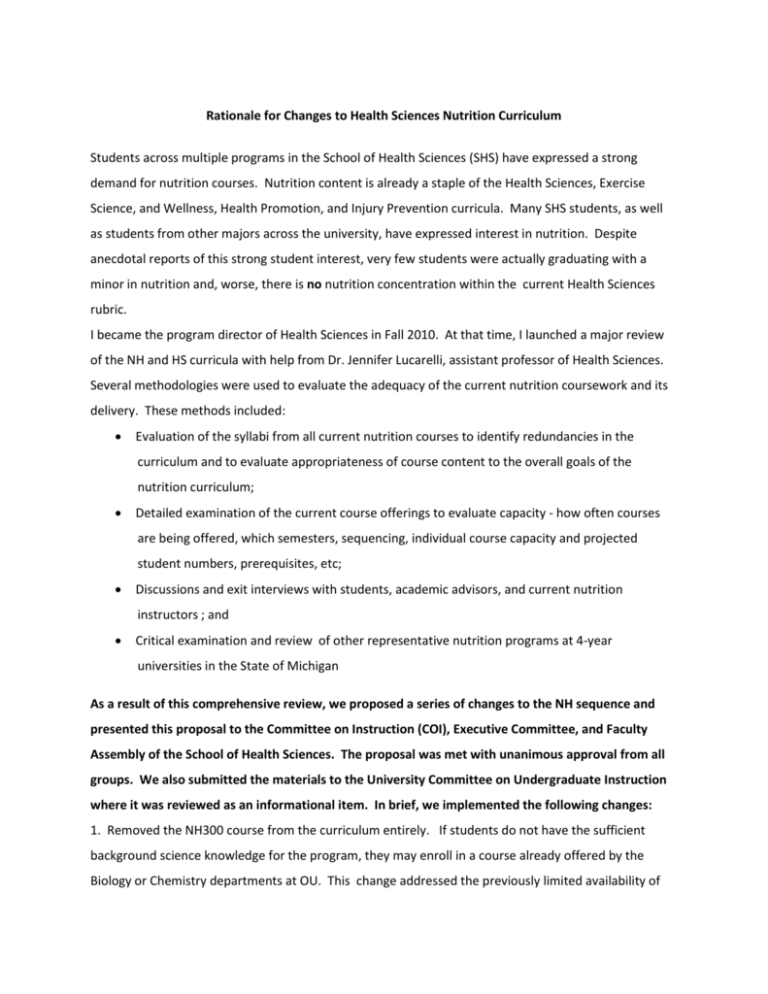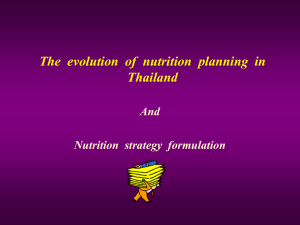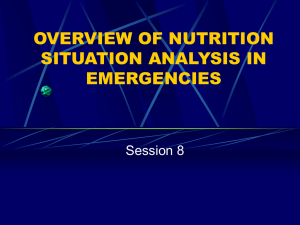OAKLAND UNIVERSITY
advertisement

Rationale for Changes to Health Sciences Nutrition Curriculum Students across multiple programs in the School of Health Sciences (SHS) have expressed a strong demand for nutrition courses. Nutrition content is already a staple of the Health Sciences, Exercise Science, and Wellness, Health Promotion, and Injury Prevention curricula. Many SHS students, as well as students from other majors across the university, have expressed interest in nutrition. Despite anecdotal reports of this strong student interest, very few students were actually graduating with a minor in nutrition and, worse, there is no nutrition concentration within the current Health Sciences rubric. I became the program director of Health Sciences in Fall 2010. At that time, I launched a major review of the NH and HS curricula with help from Dr. Jennifer Lucarelli, assistant professor of Health Sciences. Several methodologies were used to evaluate the adequacy of the current nutrition coursework and its delivery. These methods included: Evaluation of the syllabi from all current nutrition courses to identify redundancies in the curriculum and to evaluate appropriateness of course content to the overall goals of the nutrition curriculum; Detailed examination of the current course offerings to evaluate capacity - how often courses are being offered, which semesters, sequencing, individual course capacity and projected student numbers, prerequisites, etc; Discussions and exit interviews with students, academic advisors, and current nutrition instructors ; and Critical examination and review of other representative nutrition programs at 4-year universities in the State of Michigan As a result of this comprehensive review, we proposed a series of changes to the NH sequence and presented this proposal to the Committee on Instruction (COI), Executive Committee, and Faculty Assembly of the School of Health Sciences. The proposal was met with unanimous approval from all groups. We also submitted the materials to the University Committee on Undergraduate Instruction where it was reviewed as an informational item. In brief, we implemented the following changes: 1. Removed the NH300 course from the curriculum entirely. If students do not have the sufficient background science knowledge for the program, they may enroll in a course already offered by the Biology or Chemistry departments at OU. This change addressed the previously limited availability of the NH300 course that was creating a "bottleneck" to the program, and freed resources to teach nutrition-specific courses for the students. 2. Removed the NH330/331 food science courses as prerequisites for any other courses and moved this course sequence from required to elective status. 3. Increased NH402 (Community Nutrition) and NH404 (Nutrition and Culture) from 2 credits to 4 credits to reflect the amount of material that should be covered in these courses, and to match other similar nutrition programs in the State of Michigan. As part of this larger restructuring effort, we also made both of these courses required in the new minor. 4. The name of NH446 "Food Toxicology" was changed to "Foodborne Illnesses" to better reflect the course content and to reduce the negative connotations associated with the technical name that has served to deter students from enrolling in the course until now. 5. In addition to the revamping of the current nutrition program described above, we have also added two new courses to bolster the curriculum: A) NH406 (Food Politics) a 2 credit elective class; and B) NH450 (Nutrient Metabolism) a 4 credit elective course for the nutrition minor and a required course for the nutrition major concentration. NH406 is a timely offering that will address regulatory, philosophical, economic, and political questions of food science, safety, and nutrition. NH450 is an essential course addressing micro- and macro-nutrients for students seeking to do graduate work in nutrition or pursue a registered dietetics degree. 6. In addition to the curricular changes detailed above, we increased the course capacity across the NH sequence to be more responsive to student needs. Again, we conducted a thorough review of student interest, room capacity, and current enrollment capacity with an eye to where we might be able to increase the number of student enrolled with no additional costs. Most specialized elective courses have been increased to accommodate 25 students per class. Other core required courses (NH301, NH340) will be increased to a capacity of 45-100 students per class depending on semester and instructor load. 7. Finally, we have created a new concentration in Nutrition and Health within the BS in Health Sciences rubric. This concentration is well-positioned to meet the needs of undergraduate students within the university who are interested in careers in health, medicine, wellness, dietetics, and public health. OAKLAND UNIVERSITY SCHOOL OF HEALTH SCIENCES B.S. DEGREE HEALTH SCIENCES NUTRITION AND HEALTH CONCENTRATION 2011-2012 CATALOG Name ________________________________________________ Date _______________ REQUIRED COURSES TRANSFER COURSE CREDIT BIO 111 Biology 4 BIO 205 Human Anatomy 4 BIO 206 or 322 Anatomy Laboratory 1 BIO 207 or 321 Physiology 4 CHM 157 General Chemistry I 5 CHM 158 General Chemistry II 5 STA 225 Statistics 4 PHY 101 General Physics I 4 PHY 102 General Physics II 4 PHY 158 Laboratory 2 PSY 100 Introductory Psychology 4 HS 201 Health in Personal & Occupational Env 4 HS 302 Community and Public Health (formerly known as HS 202) HS 450 Law, Values and Health Care WRT/RHT 150 Composition I GRADE 4 4 Credits do not count toward 124 required for major GENERAL EDUCATION REQUIREMENTS (24 Credits) Writing Foundations WRT/RHT 160: Composition II Writing Intensive in General education Can be satisfied by major: EXS 350 Writing Intensive in Major Satisfied by major: HS 450 Formal Reasoning Satisfied by major: STA 225 4 Arts 4 Foreign Language and Culture 4 Global Perspective 4 Literature 4 Natural Science & Technology Satisfied by major: BIO 111, CHM 157, PHY 101, HS 201 Social Science Satisfied by major: PSY 100 Western Civilization 4 Diversity Satisfied by major: HS 302 (formerly HS 202) Knowledge Applications Satisfied by major: PHY 102 Capstone Satisfied by major: HS 450 NUTRITION and HEALTH ACADEMIC CONCENTRATION (30 credits) MTH 141 Precalculus or MTH 154 Calculus 4 NH 301 Human Nutrition and Health 4 NH 311 Contemporary Topics in Nutrition 2 NH 340 Nutrition and Lifecycles 4 NH 402 Community Nutrition 4 NH 404 Nutrition and Culture 4 NH 450 Nutrient Metabolism 4 PSY 250 Intro to Research Design 4 *MINIMUM OF Seventeen CREDITS FROM THE FOLLOWING: (AT LEAST 8 CREDITS AT 300+400 LEVEL AND AT LEAST 4 CREDITS MUST BE CHOSEN FROM NH COURSES): AHS; BIO 491; CHM 234, 235; EXS; HS 300-400 level; MLS; NH 300-400 level; PSY 225, 321, 322, 323, 333, 338, 344; EXS 215, 350; WHP 300-400 level 17 (8 of 17 at 300/400 level 4/17 from NH courses) or any other course approved by the program director in writing MINIMUM CREDITS REQUIRED FOR DEGREE 124 AT LEAST 32 CREDITS AT THE 300 OR 400 LEVEL ARE REQUIRED FOR GRADUATION. Specific course requirements & credit associated with courses are subject to change. Students need to consult with their academic adviser to stay informed. Please make sure you meet all prerequisites for a course before registering for that course.








